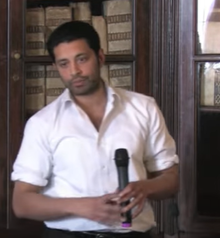Arif Mohuiddin Ahmed MBE is the Director for Freedom of Speech and Academic Freedom of the Office for Students, following his appointment in June 2023.[1] Prior to this, Ahmed was a philosopher at the University of Cambridge, where he became a fellow of Gonville and Caius College in 2015,[2] university reader in philosophy in 2016,[3] and Nicholas Sallnow-Smith College Lecturer in 2019.[4] His research interests include decision theory and the philosophy of religion, from an atheist and libertarian point of view.[2] Ahmed studied mathematics at St Anne's College, University of Oxford and philosophy at Sidney Sussex College, University of Cambridge.[5]

At Cambridge he has been an advocate for the protection of freedom of speech, in reaction to the university administration's cancellation of an invitation to the politically conservative academic Jordan Peterson.[6][7][8] In 2020, Ahmed also led opposition to the University's proposed amendments to its freedom of speech policy, ultimately concluding with the rejection of the amendments.[9][10]
Ahmed was appointed Member of the Order of the British Empire (MBE) in the 2021 Birthday Honours for services to education.[11] In late 2022, the Minister for Women and Equalities, and Trade Secretary, Kemi Badenoch MP appointed Ahmed as new Commissioner to the Equality and Human Rights Commission (EHRC) Board.[12] He left the EHRC after being appointed Director for Freedom of Speech and Academic Freedom at the Office for Students (OfS) in June 2023.[1][13]
Books
editAhmed is the author of the books Saul Kripke (Continuum Books, 2007), which analyses the philosophy of Saul Kripke,[14] and Evidence, Decision and Causality (Cambridge University Press, 2014), which defends evidential decision theory and critiques causal decision theory.[15] Ahmed is also the editor of both Wittgenstein's Philosophical investigations: A critical guide (Cambridge University Press, 2010)[16] and Newcomb's Problem (Cambridge University Press, 2018).[17]
References
edit- ^ a b "Office for Students announces its first Director for Freedom of Speech and Academic Freedom". Office for Students. 1 June 2023. Retrieved 8 June 2023.
- ^ a b "Arif Ahmed". Gonville and Caius College. Retrieved 11 December 2020.
- ^ "Arif Ahmed". Cambridge Faculty of Philosophy. 7 February 2014. Retrieved 11 December 2020.
- ^ "Investing in teaching". Once a Caian. No. 19. 2019.
- ^ "Professor Arif Ahmed". Gonville & Caius. Retrieved 10 May 2023.
- ^ Quinn, Ben (10 December 2020). "Cambridge University urged to re-invite rightwing academic Jordan Peterson". The Guardian.
- ^ Whitworth, Damian (5 December 2020). "The Cambridge professor fighting 'academic McCarthyism': Freedom of speech is fragile, Arif Ahmed tells Damian Whitworth". The Times.
- ^ Turner, Camilla (9 December 2020). "Cambridge University dons win free speech row, defeat new 'authoritarian' rules".
- ^ Quinn, Ben (9 December 2020). "Cambridge University rejects proposal it be 'respectful' of all views". The Guardian. ISSN 0261-3077. Retrieved 15 September 2023.
- ^ "Cambridge University votes to safeguard free speech". BBC News. 9 December 2020. Retrieved 15 September 2023.
- ^ "No. 63377". The London Gazette (Supplement). 12 June 2021. p. B15.
- ^ "New EHRC commissioners appointed". 4 December 2022.
- ^ Freeman, Rob (1 June 2023). "University freedom of speech champion says 'democracy at stake'". The Independent. Retrieved 26 October 2023.
- ^ Reviews of Saul Kripke: Anton Petrenko, Phil. in Rev., [1], [2]
- ^ Reviews of Evidence, Decision and Causality: James M. Joyce, J. Phil., doi:10.5840/jphil2016113413; H. Orri Stefánsson, Phil. of Sci., doi:10.1086/684183; Paul Weirich, Notre Dame Phil. Rev., [3]
- ^ Reviews of Wittgenstein's Philosophical investigations: David Macey, Phil. Rev., [4]; George Lazaroiu, Linguistic and Philosophical Investigations, [5].
- ^ Reviews of Newcomb's Problem: J. Dmitri Gallow, Economics & Philosophy, doi:10.1017/S0266267119000178; Jack Spencer, Notre Dame Phil. Rev., [6]
External links
edit- Profile at University of Cambridge
- Arif Ahmed publications indexed by Google Scholar